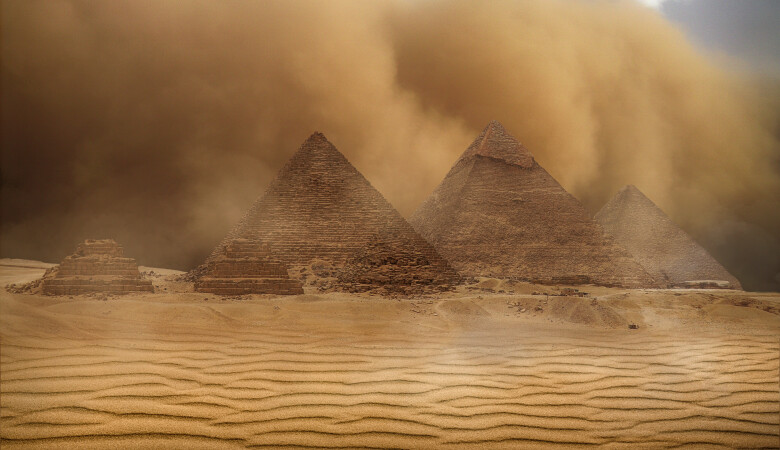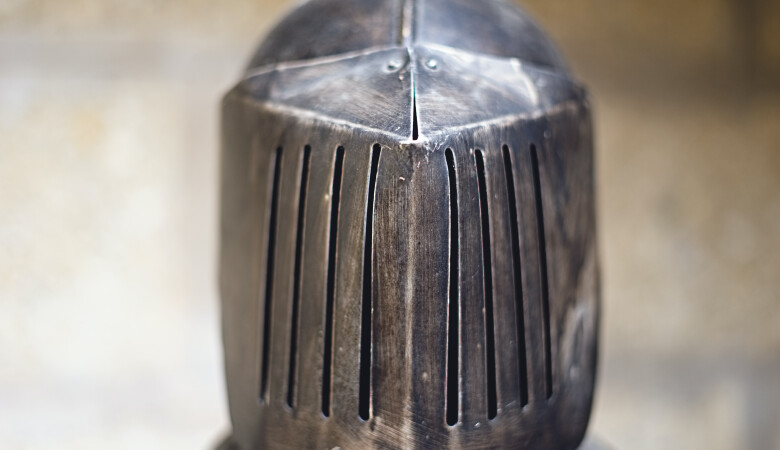The Tragic End of Short-Sighted Faith (Isaiah Sermon 43 of 80)
March 03, 2013 | Andy Davis
Isaiah 39:1-8
Faith, Humility, Judgment
Pastor Andy Davis preaches a verse-by-verse expository sermon on Isaiah 39:1-8. The main subject of the sermon is the tragic end of short-sighted faith.
- Sermon Transcript -
I. Hezekiah’s Erratic Journey of Faith
One of my favorite passages describing the ministry of Jesus Christ, the person and work of Christ, quotation from Isaiah employed by Matthew in Matthew 12:20, "A bruised reed he will not break, and a smoldering wick he will not snuff out, until he leads justice to victory." For years I have cherished that verse, having read a sermon that Richard Sibbes, a Puritan, spoke on that bruised reed and smoldering flax, 1631. He says that this text, Matthew 12, portrays the gentleness and tenderness and skill of Jesus in dealing with sinners, broken sinners like us, in bringing about his final outcome in each one of us. The text says that we are pictured as sinners like bruised reeds. You could picture just grass kinda bent over and hanging by slender green threads by a marsh where you feel like the slightest bump would finish the tearing, and it would be severed and would fall. Christ has the power and the skill and tenderness and gentleness to bind up the bruised reed and heal it completely. But in a similar way, we have this smoldering flax, picture of a frail ember flickering, smoldering, putting off both fire and smoke, about to go out, not a roaring fire of piety and zeal, love for God, not a bonfire of commitment and holiness and purity, power, but rather a smoldering flax emitting both some evidence of God's grace and some evidence of indwelling sin all the time.
Christians are a mixture at all times, both grace and corruption evident in our lives, yearnings for God and yearnings for sin. A mixture of both good works and bad. Moments of great victory soon followed by episodes of shameful pride or cowardly retreat. Paul puts it quite plainly, explaining it theologically in Galatians 5:17, "For the flesh desires what is contrary to the Spirit, and the Spirit desires what is contrary to the flesh; these are at enmity or are opposed to one another, so that you do not do what you want." That's a description of the Christian life, the smoldering flax.
"Christians are a mixture at all times, both grace and corruption evident in our lives, yearnings for God and yearnings for sin. A mixture of both good works and bad."
Sibbes gives evidence of this smoldering in a variety of passages of Scripture. The disciples cry out, "Lord, save us; we perish!” Here you have the smoke of unbelief, and yet the light of faith stirred them up to pray to Christ. The father of the demon-possessed boy cries out, "Lord, I believe." There is the light. But he also says, "Help my unbelief." There is the evidence of the smolder of unbelief. "O wretched man that I am!" says the Apostle Paul in Romans 7. There is the smolder, the smoke of indwelling sin. “Who will rescue me from this body of death?” But then comes, “Thanks be to God through Jesus Christ, our Lord," and there's the light of grace. And Christ will not extinguish this smoldering flax. Why not? Well, because the spark comes from heaven. He lit the spark in us. It was he that began the work of grace in our hearts. It's kindled by his own spirit, and that work of grace, that fire of grace inside us tends toward his own glory. Therefore, he cherishes it and he will not let it go out.
So we see how Christ bears with the corruption in Thomas, doubting Thomas, "Unless I put my finger in the nail marks and my hand in the side, I will not believe." But then you see the work of grace, when he falls down in front of Jesus and says, "My Lord and my God," and he's going to bear with the two disciples on the road to Emmaus, who are so depressed and discouraged on Resurrection Sunday. “We had hoped that he was going to be the one.” There is the smolder of unbelief. But by the time they get done, their hearts are burning within them, zeal for the glory of God and for his kingdom. Peter denied him, but he denied not Peter but continued to work in his life. "If you will, you can make me clean," said one leper, there is the smolder and there is the spark of grace all at once. Or another one said, "If you can do anything, help my son." Jesus deals with both ifs very tenderly. “If you are willing.” “I'm willing. Be clean.” “If you can.” “If you can? All things are possible to him who believes.” Aren't you glad that he doesn't extinguish the smoldering flax of your faith? Aren't you glad that he has the skill to nurse it into a roaring fire, and that he is gentle in dealing with us?
Now we come to Hezekiah and Hezekiah's faith is a smoldering flax. You see noxious smoke and you see also evidence of grace. Hezekiah is mighty through faith to purge Israel's religion of its high places—he finally gets rid of them. That's the light, the fire of grace. But he's weak and he flickers always in the same area, and that's politics, the security of the kingdom of the realm. He trusts to political alliances. That's the smolder going on in his life. He stumbles again and again, and not trusting the Lord alone to save Judah from its enemies. He walks with the Lord in piety and godliness concerning the laws of Moses. That's the fire, that's grace. But he smolders and flickers concerning Egypt. Despite Isaiah's constant warnings, he sends out emissaries with gold and silver to hire their horses, their chariots, to come and fight for Judah. That's the smolder, the smoke.
He is strong in faith to break with the king of Assyria and serve him no longer and send him no more tribute. By faith he did that, but when the king of Assyria invades him, he sends all the gold and silver in the kingdom to buy him off, and he says, "I've sinned, please forgive me." He says that to the king of Assyria. There is the smolder. His faith is on display in Isaiah 37 when he spreads out that letter from Sennacherib king of Assyria and humbles himself and asks for God to deliver them. You see his faith on display there. You see a mingled faith with smolder in Isaiah 38 as he gets sick, and he cries like a baby, and he says, "Remember all the good things I've done for you, God." And he says, "Like a lion, you stopped me down; like a lion you broke my bones." He looks on God a bit as an enemy there, but yet he turns to God at that weakness, at that time of weakness and he prays. He says, "Oh Lord, come to my aid."
Now, when we come to Isaiah 39, we come to the final chapter in the book of Isaiah on Hezekiah's mixed pilgrimage. After all the mighty things that God has done for him in the account, we have, I think, a rather sad end. Hezekiah's pride and short-sightedness are on display; they are exposed here. Again, we have a smoldering flax. Emissaries, envoys come from Babylon, and so they're coming right at him in his weak area, the area of politics, the area of the future of his kingdom of Judah. I believe that they are seeking an alliance with Judah, that they can join together with Judah against a common foe, Assyria. Hezekiah, I think, reverts to the same old pattern: he trusts in politics and in alliances rather than in the living God alone. He is filled with pride in this account, and in the parallel accounts in 2 Chronicle, 2 Kings, boastfully displaying silver and gold, a military strength and failing to give glory to God for all that God has done for him. It seems to me that he's going back to trusting in the arm of man, in the arm of Babylon again, rather than in the arm of God alone.
And when Isaiah rebukes him with a rather shocking prophecy of where they're heading, where the future is going, where they're going in the future, Hezekiah responds, in my opinion, with a stunningly short-sighted and selfish answer, showing a lack of concern for the future generations of Judah and even of his own family. Hezekiah is an example then of a smoldering flax and is inconsistent, but still grace-filled life with God. And to me, this is just some of the great evidence of the truthfulness of Scripture, that even its great heroes are displayed honestly in their smoldering faith. Aren't you encouraged by this? We're not rooting for Peter to fail, but we're so glad in one sense that he did. Amen? Because when you look at that, you say, "Thanks be to God—there's a place for someone like me. And you're not going to cast me off, but you're going to restore me and you're gonna work with me and you're patient with me, 'cause boy, do I see a lot of smolder in my life. Praise be to God, I also see the spark of light and grace in my life too. Thanks be to God for that.”
Now, as we come to Isaiah 39, we come in some way to a gateway, a bit of a hinge to the rest of the book of Isaiah. We have a doorway, Isaiah 39 gives us a doorway into Isaiah 40-66, those chapters. The first half, so to speak, the first section of Isaiah 1-39, predominantly has been God and Assyria, God and Assyria. The second portion is going to be predominantly God and Babylon, or God and the exile to Babylon and the restoration from that exile. So we're at a hinge.
Now, you may ask, why then is this your last sermon in Isaiah for a while (which it is)? It's just been my regular pattern to preach in a book for a while to have a sense of when that while has come to an end, and to go to other works. You said the same thing when I finished in Matthew the last time, and we're going back to Matthew, so rejoice. Alright? And we'll go back to Isaiah 40 in good time, if the Lord allows us time. I think Isaiah 40 is one of the greatest chapters in the Bible. Someone said to me, "We're leaving at Christmas Eve, and we don't get Christmas." It's like, alright, well just be excited and pray that God will extend my life and yours, and we'll have a chance in the future to hear some sermons on Isaiah 40, but which I could probably preach an incredible number, almost as bad as Hebrews 11, but maybe not quite as bad as that. So, we're gonna be turning to Matthew 26-28 next week, and we're gonna be taking that journey with Christ to the cross, into the empty tomb and to the Great Commission. So I'm excited about that.
Now, as we come to Isaiah 39, we come to questions of chronology and archaeology and order, and I don't wanna spend a lot of time on this, but let me just give you some background. We have mentioned in the text, Merodach-Baladan son of Baladan king of Babylon, who is that? Well, he was a Chaldean or Babylonian. Babylon was a city down the end of the Fertile Crescent, away from Assyria and part at this point of the Assyrian empire. Like Judah and like all these other small kingdoms, they hated and feared Assyria. When Sargon died, and Sennacherib, his son took over, Merodach-Baladan son of Baladan king of Babylon led a rebellion, a revolt against a serious power. Now his father, Sargon had defeated him a decade and a half before it and had put him to flight, Merodach-Baladan. But now he's back, and he was challenging Assyria. And Assyria defeated Merodach-Baladan, and the Babylonians in battle, and kept Babylon under its heel for another while.
Meanwhile, this man, Merodach-Baladan fled to Elam, some region of Elam, and he continued in some sense to carry on some agitation against the Assyrian Empire. Now, I don't wanna get into issues of chronology here. I have about two pages of it. Forget it. We don't have time. Let me just say, I accept the order in the Bible. I think that first, you have the Assyrian invasion, the defeat of Assyria by the angel of the Lord, then Hezekiah's sickness, his restoration, and then this visit from Babylon. The reason I say that is the same in 2 Chronicle, 2 Kings in Isaiah, that's the order given. Some scholars want to reverse the order, it has to do with the 15 years, the extension of King Hezekiah's life, and when they think Hezekiah died and all that. But let's just trust the order here, and I think it's actually helpful to do it.
And what I think is happening in 2 King, 2 Chronicles, and now here in Isaiah 39, as these envoys have been sent from this man, Merodach-Baladan, a rival subject king to the Assyrians, to try to make some kinda political alliance against Assyria. Now you may say, “Assyria was defeated.” Well, no, they lost 185,000 troops, but they're not finished, and they were gonna go on for a few decades longer. And so, they're still a threat, they're greatly weakened, but still a threat. So I think the envoys have been sent here saying, "Hey, in effect, we have a common enemy, let's join forces."
II. The Babylonian Envoys and Hezekiah’s Foolish Pride (vs. 1-2)
So now we begin at verse 1-2 with the Babylonian envoys and Hezekiah's foolish pride. Verse 1-2, “At that time Merodach-Baladan son of Baladan king of Babylon sent Hezekiah letters and a gift, because he had heard of his illness and recovery. Hezekiah received the envoys gladly and showed them what was in his storehouses—the silver, the gold, the spices, the fine oil, his entire armory everything found among his treasures. There was nothing in his palace or in all his kingdom that Hezekiah did not show them.”
So here we have a glimpse, a snapshot now of Hezekiah's wealth and power and prestige. Remember that Assyria was a terrible enemy, greatly hated by their subject peoples. And so, many smaller kings wanted to throw off Assyria's power. When Assyria lost 185,000 troops outside the walls of Jerusalem, many smaller peoples rejoiced greatly in that, celebrated and were elated at the defeat at that point of Assyria. In these smaller realms, it says in 2 Chronicles 32:23, “Many brought offerings to Jerusalem for the LORD and valuable gifts for Hezekiah king of Judah. From then on Hezekiah was highly regarded by all the nations.” So, in the wake of this incredible defeat of Assyria, Hezekiah has become rich and powerful and popular. Danger, danger, but that's what's gone on here.
Now, we must imagine that the Assyrians left behind huge amounts of booty from all of the smaller kingdoms that they had been conquering one after the other. Remember I said that Hezekiah more or less was dealt with last, so they've already taken all kinds of material possessions from these smaller kingdoms, and they brought them with them in their invasion of Judah, and now they're all dead and they left them behind. So who gets them, but the Jews? Who gets them, but Judah and Hezekiah? And now he's rich again. And so, it says in 2 Chronicles 32:27-29, “Hezekiah had very great riches and honors.” As a matter of fact, it probably is beneficial for you to just put your finger here and go over to 2 Chronicles 32 and look with me, because there's a parallel account here. Look at them both, or you can just listen, but 2 Chronicles 32:27-29, it says, "Hezekiah had very great riches and honor, and he made treasuries for his silver and gold and for his precious stones, spices, shields, all kinds of valuables. He also made buildings to store the harvest of grain, new wine and oil. He made stalls for various kinds of cattle and pens for his flocks. He built villages and acquired great numbers of flocks and herds, for God had given him very great riches." So, he's become very wealthy, he's become highly esteemed, he's very popular with these surrounding nations, and he builds bigger barns, so to speak, big storehouses for all the stuff that God has given him now.
Hezekiah has two weak spots, pride and self-reliance, especially politically. So he has pride after his victory, as we're gonna see later, and pride during his illness, and you see that as he is very proud of what he's achieved and doesn't think that God's dealing with him fairly. And so, it says in 2 Chronicles 32:24-25, "In those days, Hezekiah became ill and was at the point of death. He prayed to the Lord, who answered him and gave him a miraculous sign. But Hezekiah’s heart was proud and he did not respond to the kindness shown him; therefore the Lord's wrath was on him and on Judah and Jerusalem." Pride, pride led him to forget what God had done for him and to take more credit for it than he should have. Self-reliance led him to look for future security, to maybe an alliance with Babylon or his own political scheming and all of that, and not to look to the Lord, to God alone. Now remember that God had said in Isaiah 37, "I will deliver this city from the hand of the king of Assyria. I will protect this city for your sake and for the sake of David my servant." He said, "I'm gonna protect you. So you don't need to make any more alliances. Stop trusting in politics. Stop trusting in political alliances. Trust in the Lord, trust in me."
And so as a result of this, God decides to test and expose Hezekiah's heart. It's a very sobering moment here for us. Look, if you're in 2 Chronicles 32, look at verse 31, if not just listen. The envoys from Babylon came as a test for Hezekiah. God was testing him. And so in 2 Chronicles 32:31, it says, "But when envoys were sent by the rulers of Babylon to ask him about the miraculous sign that had occurred in the land." It just brings chills me to say this phrase, "God left him to test him and to know everything that was in his heart." You can just circle that and meditate on it, "God left him to test him and to know everything that was in his heart." God was seeking to expose the thoughts of Hezekiah's heart, to press on him, to put pressure on him, and push those thoughts to the surface so that he could see them and know that they were there.
Now, what motivated the Babylonians to come? Well, it says in 2 Chronicles 32:31, they had heard about the miraculous sign in the land. Now that had to do is you remember with the shadow, remember on the stairway of Ahaz, how it was the normal thing for it to go down, and so Hezekiah asked for it to go backward, and so it could be that there was in some way some mysterious celestial portend, something in the heavens. And the Babylonians, the Chaldeans were really big on stars and all that kind of thing, and they were interested in it. So there was that, but then there was the angle of the political alliance against Assyria as well. So in the text it says they're interested in the miraculous sign, they wanted to ask about it, but also I think there's this politics as well.
So the envoys come and Hezekiah takes them on a prideful tour. “Come and see. Have I got some things to show you.” He receives these ambassadors, these envoys with great joy and pride. He's impressed by the fact that they've come from a distant land. He says it to Isaiah, “They've come from a distant land.” He is filled with a sense of his own importance that his fame has reached so far that they've heard of him that far away, and so he takes these important visitors on this extensive tour of his capital city and in his newly liberated land, shows them everything, all his wealth his treasures, military weaponry, but there's no mention that he witnessed to them of the greatness of the God of Abraham, Isaac, and Jacob. He didn't speak to these envoys about the God who did it all. He didn't it seems give glory to God as this tour was going on. These pagan diplomats are not given, it seems to me, the theology behind all of what happened here. The zeal of God for his own glory, his holiness, his omnipotence, his wisdom.
Now, you remember the Queen of Sheba came from the south to visit Solomon, and when he gave her a similar tour, it says her breath was taken away, but this is what she said, 1 Kings 10:9, "Praise be to the Lord your God, who has delighted in you and placed you on the throne of Israel. Because of the Lord's eternal love for Israel, he has made you king, to maintain justice and righteousness." The Queen of Sheba gives glory to God for everything that Solomon showed her. Now, it could be she had a predisposition to believe it or already knew some things. Or Solomon witnessed to her. But in any rate, these envoys don't seem to have given glory to God, because it didn't seem Hezekiah gave glory to God.
III. Isaiah Interrogates Hezekiah (vs. 3-4)
So it's time for Isaiah to come into the picture. Remember I said that God left him to test him. I think part of that was Isaiah stayed away. Stayed away. Just let him do what he was gonna. Just let him do what he's gonna do. Just go ahead and do it. Whatever you're gonna do, just do it. So he stayed away. God left him. Now Isaiah comes back into the picture, verse 3-4, and he interrogates Hezekiah, "Then Isaiah the prophet went to King Hezekiah and asked, 'What did those men say, and where did they come from?' 'From a distant land,' Hezekiah replied. ‘They came to me from Babylon.’ The prophet asked, ‘What did they see in your palace?’ ‘Well, they saw everything in my palace,’ Hezekiah said. ‘There is nothing among my treasures that I did not show them.’"
So Isaiah comes to confront this prideful King. I get the picture of Hezekiah full of himself going home to his palace contended and happy, and there's Isaiah waiting for him. I get that picture, I don't know if that's how it happened but, you know, and I have the feeling that Hezekiah must have groaned a little bit, "Oh, hi. How are you?" And this prophet, the very one who had predicted the downfall of Assyria, the very one who had predicted his own healing and had actually, seems to have been, an agent of the healing ministering that poultice of figs, this very one has now come with a different mission now, different mission. How tough it is to be prophet of God. You go and you say what God tells you to say. Sometimes it's a happy message, sometimes it's not. This was not a happy mission here.
And so Isaiah begins the interrogation. Two questions: "What did those men say, and where did they come from?" Begins to probe. He inserts himself into the level of high geopolitics. He's invading and speaking into that. Can I tell you God's word fits anywhere? God can speak into any situation he wants, because he is the King of Kings and the Lord of Lords, and so he comes, he says, "I have some things to say," but he doesn't say them he just asks. Notice Hezekiah's selective answer. Isaiah asked two questions, Hezekiah answers one. "What did those men say, and where do they come from?" "Oh, they came from Babylon, from a distant land." Well, it's a true answer, but it's not the whole answer. “What did you talk about?” I'm guessing they talked about alliances, I'm guessing they talked about military strength and power, that's what I think they probably talked about, but Hezekiah didn't mention that because he knew exactly where Isaiah stood on all that.
So Isaiah asked a second question, “‘What did they see in your palace?’ ‘Well, they saw everything in my palace,’ Hezekiah said. ‘There's nothing among my treasures that I did not show them.’” That's a full answer and an honest one. No point in lying to the prophet, dear friends. He already knows, so you might as well tell him the truth. And I think this is one of those chilling moments, those chilling moments, when Isaiah looks at you and says, "Hear now the word of the LORD Almighty." Goosebumps, you know? “What are you gonna say to me?” "Hear now the word of the LORD Almighty: The time will surely come when everything in your palace and all that your fathers have stored up until this day, will be carried off to Babylon. Nothing will be left, says the LORD. And some of your descendants, your own flesh and blood who will be born to you, will be taken away, and they will become eunuchs in the palace of the king of Babylon."
Now, Isaiah sees far. He's already uttered the prophecy of the fall of Babylon, he's already spoken it twice, Isaiah 13, he said, "Babylon, the jewel of kingdoms, the glory of the Babylonian’s pride will be thrown down like Sodom and Gomorrah," that's Isaiah 13. He says it again in Isaiah 21, "Look, here comes a man in a chariot with a team of horses. And he gives back the answer, 'Babylon has fallen, has fallen! All the images of its gods lie shattered on the ground!’ O my people," he says, "crushed on the threshing floor, I tell you what I have heard from the LORD Almighty, from the God of Israel." So already Isaiah 13, Isaiah 21, we already have the end of the story on Babylon. They're going to get destroyed, completely destroyed. Isaiah see's far.
But here, the prophecy gets enhanced. Before that happens, before Babylon gets crushed to the ground never to rise again, never to be rebuilt. Before that happens, Judah will go into exile in Babylon. Now, that's new, we hadn't heard that one. Now, this would not happen for another 115 years, but what are 115 years between God and the prophet, and between the prophet and the people? They're nothing. God knows what's gonna happen millennia down the road, and so he knows very clearly what's going to happen, and he gives Hezekiah some devastating details. That tour, all of those shiny, nice things, the precious oils and all that, the spices, all that, the gold and silver—that's all going away, all of it, it's all going away. It's going to Babylon, and then the stark statement, “Nothing will be left.” But then it gets even worse. “Let's talk about your descendants, let's talk about your children, grandchildren, great-grandchildren. Let's talk about that. Some of your own flesh and blood," he says. "Some of your own descendants . . . who will be born to you, will be taken away, and they will become eunuchs in the palace of the king of Babylon.”
Now, apparently at the time of his illness, Hezekiah had no heir. It seems that he had no heir. In the extension of his life, 15 years in that time, he would have a son, Manasseh. We'll talk more about him in a moment, but it seems that God was going to give him an heir, but here there's a dreadful prophecy about the future of all of that. “He's gonna give you a son, but beyond that, your descendants they are going to become eunuchs in the palace of the king of Babylon.” Now, a eunuch was a male castrated, so he wouldn't be sexually active among the emperor's harem, so he could be trusted around the women, and they frequently became palace advisors, counselors, administrators. To be a eunuch clearly was to be excluded from the lineage of the Messiah ‘cause you couldn't procreate and to be excluded from the assembly of the Lord, according to Deuteronomy 23:1. So this is a devastating prediction. How then can we understand Hezekiah's reaction?
IV. Hezekiah’s Short-Sighted Reaction (vs. 8)
Look at verse 8, “‘The word of the LORD you have spoken is good,’ Hezekiah replied. For he thought, ‘There will be peace and security in my lifetime.’" Now, when Isaiah predicted the fall of Babylon in Isaiah 21, this was his reaction to the future. He said in Isaiah 21:3-4, "At this my body is racked with pain, pangs seize me, like those of a woman in labor; I'm staggered by what I hear, I'm bewildered by what I see. My heart falters, fear makes me tremble; the twilight I longed for has become a terror to me." And then later, as we've already said, "O my people, crushed on the threshing floor, I tell you what I've heard from the LORD Almighty." That was Isaiah's reaction. Again, Hezekiah's thoughts are exposed. “For he thought, ‘There’ll be peace and security in my lifetime.’”
V. Applications
So that's the end of the explanation, what applications? What applications? Well, first, do not trust in heroes, do not trust in people like Hezekiah, they're going to let you down. There's really in the end, only one true hero in Scripture, and that's Jesus. Jesus is the only true hero. Put your hope in Jesus Christ and him alone. He is the true Son of David. He is the true one who cares about his posterity, and he had a spiritual posterity, sons and daughters, who he is going to win into the family of God, and they would extend for generations, even millennia. And so it says in Psalm 22:30-31, speaking of Christ, “Posterity will serve him; future generations will be told about the Lord. They will proclaim his righteousness to a people yet unborn—for he has done it.” Does Jesus care about posterity? You better believe he cares about posterity. He cares about generations yet unborn. He cares enough to die for them, to shed his blood for them, so that we might have eternal life.
"There's really in the end, only one true hero in Scripture, and that's Jesus. Jesus is the only true hero. Put your hope in Jesus Christ and him alone. He is the true Son of David."
Put your trust in Jesus, put your trust in Christ. Every human being is gonna let you down, and you're gonna let every other human being down. Don't just put it out there, it's you too. We are sinners. We need a savior, and Jesus is the Savior. Put your trust in Christ, crucified, his blood shed, Christ risen, so that we may live in newness of life, trust in Christ and him alone. I don't know what brought you here today. I don't know if you come here because you're a member, you come every week, I don't know if you're here as a first-time visitor, I don't know if you are saved, all of you. I don't know, I always assume that not all of you are. But if you're here in an unsaved state, I urge you to flee to Christ today. You don't know when your dying day is, you don't know how much longer you have to live. Trust in Christ and him alone. And if you're hearing this and you are saved, take this message right now that I'm saying this part of the sermon and bring it out to some lost person this week and urge them to repent and come to faith.
Secondly, God searches hearts to expose our hidden sins. Providentially, he bring circumstances into your life, he brings things about in your life and presses on you so that these things come to the surface, 2 Chronicles 32:31, "God left him to test him and know everything that was in his heart." God does that to you too. Now, what do I mean by God left him? I think what it means is that God, in some way, experientially pulls back, and you're kind of on your own, and then the circumstances come, and when you're on your own, what you do floats to the surface, and God says, "Just do what you do." He's also told us that when he leaves us alone, we do nothing but sin. For he said in John 15, "I am the vine; you are the branches. If you remain in me and I in you, you will bear much fruit," for "Apart from me, you can do nothing." So when God leaves you, you will sin, and so God pulls back and allows circumstances to press things up in your heart so that you can see them. So it says in Revelation 2:23, "Then all the churches will know that I am he who searches hearts and minds, and I will repay each of you according to your deeds."
God reaches down into your hearts and searches your hearts. Proverbs 20:5, "The purposes of a man's heart are deep waters, but a man of understanding draws them out." Even better, the Holy Spirit draws them out, right? God draws out your deep waters, and he shows you basically, you know what I think is going on in the Highway of Holiness, sanctification? God takes you by the hand into the basement of your heart and takes you on a tour of who you really are, and he shows you how much you needed Jesus every day of your lives. And so God leaves us to test us. The Christian doesn't fight this. Christian just says, Psalm 139, "Search me, O God, and know my heart; test me and show me my anxious thoughts and my evil ways. Bring them to the surface and get them out of me 'cause I'm sick of them. Search me, O God. And bring these things into my life."
Thirdly, man is tremendously susceptible to pride. Doesn't it almost nauseate you that Hezekiah could have been proud of the deliverance from Assyria? What did he do? What great thing did Hezekiah do? OK, I'll tell you what he did, he put on sack cloth and he went in the temple and he cried in front of God and pleaded with him to save him. That's what he did. Alright, alright, well, what great thing did he do to get healed? Well, at least he was sick. Friends, do you not see how ugly pride is? It's just ugly. And all these nations are exalting Hezekiah, it says in 2 Chronicles 32:23, "He was exalted in the sight of all nations from that time onward." He should have said something like this, Psalm 115:1, "Not to us, O LORD, not to us, but to your name be the glory, because of your love and faithfulness." He should have said something like that. So can I just train you and urge you and myself too, learn to say, “Not to me, but to God be the glory. If you see anything good in my life, if you're getting any benefit from my life then not to me, but to God's name, be the glory.” We are so prideful and so fight pride. Say in your heart, “Every good and perfect gift is from above, coming down from the Father of the heavenly lights.” I don't deserve to boast about anything. Or listen to this, 1 Corinthians 4:7, "Who makes you different than anyone else? What do you have that you did not receive? And if you did receive it, then why do you boast as though you did not?"
"We are so prideful and so fight pride. Say in your heart, “Every good and perfect gift is from above, coming down from the Father of the heavenly lights.” I don't deserve to boast about anything. "
Fourthly, notice how God has crafted human salvation to destroy pride at every turn in the road. Do you not see it? How God has crafted the salvation that just destroys pride? It started before the foundation of the world, when God chose people not based on anything he saw in them whatsoever. "Before the twins were born or had done anything good or bad—in order that God's purpose in election might stand: not by works but by him who calls—she was told, ‘The older will serve the younger,’" Romans 9:11-12. What is God's purpose in election? At least this, to destroy your pride. Step by step then “God chose the foolish things of the world to shame the wise; God chose the weak things of the world to shame the strong. God chose the lowly things of the world and the despised things—and the things that are not—to nullify the things that are.” Why, why did you do that? “So that no one may boast before him. It is because of him that you are in Christ Jesus.” Total depravity strips us of our pride. To be told, “There is no one righteous, not even one; there is no one who understands, no one who seeks God. All have turned away, they have together become worthless.” If that doesn't humble you, my friends, nothing will.
The atoning work of Christ, the fact that he worked salvation by his own self—there was no one who could work it—and he worked it himself for his own praise and glory by himself. “There was no one with me on the cross,” he would say. The resurrection of Christ strips us of pride. We couldn't have raised Jesus from the dead, He was raised by the spirit of holiness by the will of his Father. Salvation by grace through faith strips you of pride. “For . . . by grace are you saved, through faith—and this not of yourselves, it is a gift of God.” Why? “So that no one can boast.” Justification by faith alone strips you of pride, because you're not able to boast in anything. Say, "Well, at least I had faith." Friends, that's like boasting about your good eye sight while looking at the Rocky Mountains. It's like, "Wow, my eye sight is awesome. Do you see how incredible eye sight I have? I have awesome eye sight, don't I?" It's like, "What are you? Nuts? Do you not see these mountains and how majestic they are?" Faith is the eyesight of the soul. What is there to boast in? All it is is that God opened up an avenue by which he's pouring blessing into your life, that's all, and there's nothing to boast about when it comes to faith. Sanctification humbles you. Doesn't it? And are you being humbled by sanctification right now as you're wrestling with the deeds of the flesh? Are you humbled by all that? Are you humbled by the Highway of Holiness? I don't think I need to belabor this one at all. And glorification by God's sovereign grace humbles us, because the very thing you were trying for decades to achieve, he does in a moment, in an instant, and you're instantly perfect, and then he raises the body from the grave and gives you a perfect resurrection body. To God be the glory for all of it, dear friends. Salvation by grace humbles us.
Fifthly, be warned about flattery and seeking to impress the world. Don't get swept along when people notice you and start commending you for all the good things you do, for your successes in life, and all of that. Don't get sucked in by it, like Hezekiah did. Don't get sucked in, don't get impressed when people from a distant country hear about you. We have some very talented, intelligent, skillful people in this congregation. Humble yourselves before God. Give him the glory for everything you've ever done.
Sixthly and finally, the dangers of fathers lacking a multi-generational vision for their children. Do you not see it? Do you not see what happened here? “Who cares? At least there will be peace and security in my lifetime. That's all that really matters to me. As long as I'm comfortable, as long as I'm saved, as long as my life is fruitful and good, I'm fine.” Now, I don't think very many fathers and churches would dare to say those words, but are they living them out? Are they living out, “Who cares as long as there's peace and security in my lifetime?” Multi-generational vision, Psalm 78, we're supposed to declare the great works of God so that our children can hear them, so that they can tell them to their children, and then to a generation yet unborn, multi-generational vision, caring about what your great grandchildren will do.
Now, let's talk about the facts of this case. In the few years, the 15 years that were extended, God gave to Hezekiah a son, his name was Manasseh. He was the worst king Judah ever had, the worst king Judah ever had. His father took down the high places at last. Manasseh put them back. Could it be Hezekiah never told him why he took the high places down? I don't know, I don't know what Hezekiah did parenting Manasseh. I don't know. But the facts are these. He had no son. Now, he has a son, Manasseh. He says, "There will be peace and security in my lifetime. Your generations in the future are gonna become eunuchs," he doesn't seem to care, and then Manasseh becomes the worst king Judah ever had. Those are the facts. It looks like he didn't do a good job as a father. Now it is not automatically the case. He may have done a phenomenal job as a father. He may have repented based on this and said, “I need to get serious about my generations in the future,” but we have no record of that, but we do have a record of this thought pattern he has, so at least we can be warned of such a thought pattern. Manasseh committed the sins that 2 Kings 24 said, "God was unwilling to forgive,” therefore they went into Babylon. Isn't it incredible? Manasseh was the one who did it in the end.
God cares about future generations, and so I guess I would urge you fathers to ask, "Are you loving your great-great-grandchildren?" And you're saying, "Well, how do I do that?" Pour yourselves out and pour the gospel into your children and your grandchildren, and it may be you'll have a chance to see your great grandchildren. Take those moments seriously. Have your family devotions. Love your wives as Christ loved the church. Disciple your children. Talk about the word of God when you sit at home, and when you walk along the road, when you lie down and when you get up. Don't be lazy about it, don't be negligent about it, don't be mediocre about it, be hot on fire for Jesus. Love the great-grandchildren that God may give you if he tarries.
Now, as we come to the Lord's Supper, I think as I look at these applications, I think there's plenty for me to be reflective of. And one of the things, the beauties of the Lord's supper is that we have a chance to reflect, and we are to reflect on our own lives, we're to look and see if there's any sin in us, to see if there's anything we need to repent from. And so as you're preparing your hearts for the Lord's Supper, I'd like to urge you to consider if there are any things that God wants that's laying on your heart to repent from, that you repent from it. If there are any broken relationships, resolve to make them right. Do all of this meditation though in light of the shed blood of Christ, sufficient to cleanse you of sin. You are welcome to participate if you have come to faith in Christ and you have testified to that by water baptism, we'd like to welcome you. If you have not, then wait, come to faith in Christ, testify to it by water baptism, and then join us in our next Lord's Supper. Close with me in prayer.
Father, we thank you for this message, the scripture from Isaiah 39, and we pray that now as we turn our attention and our hearts to the Lord's Supper, that you would prepare us and that you would send forth your Spirit in light of your promise, and that you would be very powerfully active in this place now causing us to remember the death and the resurrection and the coming kingdom of Jesus Christ, in your name we pray, amen.































